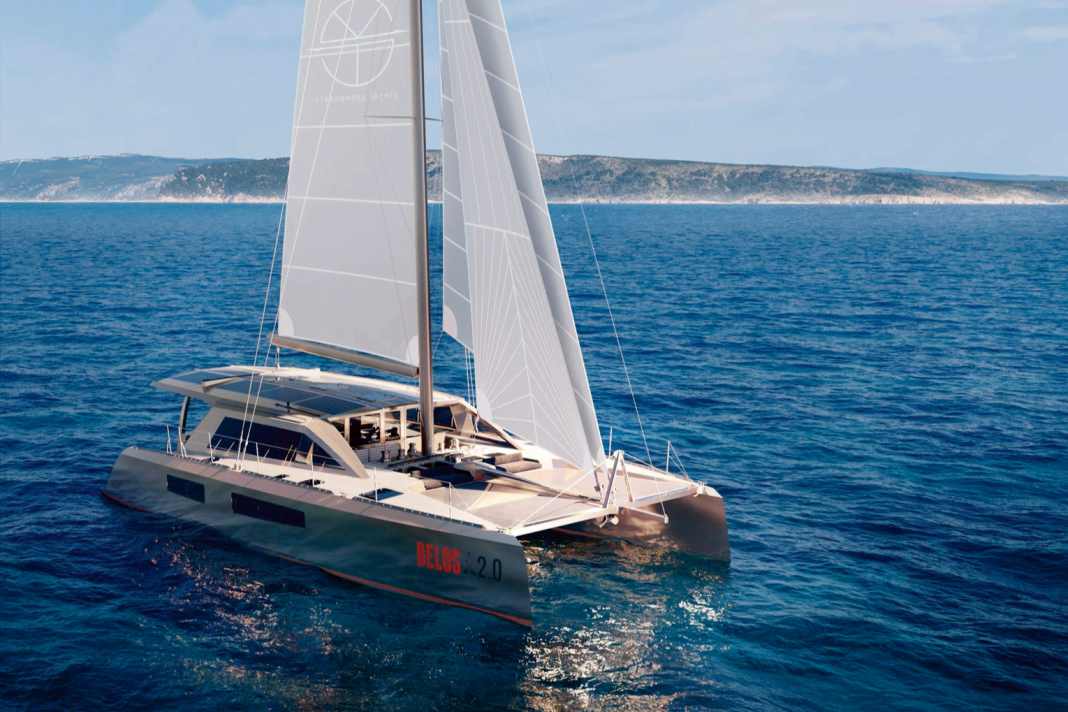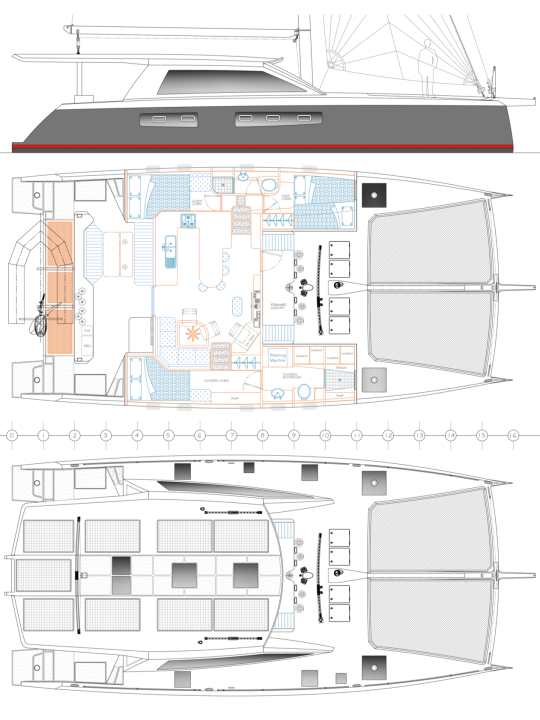Delos Explorer 53: YouTuber builds go-anywhere cat made of aluminium with hybrid drive
Fridtjof Gunkel
· 13.11.2025






The genesis of the new Explorer catamaran is remarkable. Electrical engineer Brian Trautman from Arizona runs his own software company, but dreams of a big adventure. In his early thirties, he reads the book "Three Years in a 12-Foot Boat" and develops the idea of sailing around the world. In 2008, he swapped his possessions for a Super Maramu from Amel and set off across the Pacific to Australia, giving himself two years to do so. And is still travelling today. For Brian, cruising is the "magic that changed my DNA".
Also interesting:
In New Zealand, he meets his current wife, Karin, from Sweden, who later claims to have sailed around the world by mistake. A daughter, Sierra, is born. The family lives from time to time from paying fellow sailors, odd jobs and, first and foremost, from entertaining YouTube posts, which are increasingly becoming a business model. They have 967,000 subscribers after 706 videos. This makes the Trautman channel "SV Delos" to "Sailing La Vagabonde"which also documents her life as a circumnavigator, is the second largest sailing channel on YouTube.
"Delos" has sailed around the globe from the US West Coast across the Pacific, the Indian Ocean and the Atlantic in large loops and mainly in warm waters. Now the experience gained from 15 years of excessive cruising is to be reflected in a new boat, an aluminium expedition catamaran that is "capable of sailing to all corners of the globe in safety and comfort", says Bill Trautman.
Drive with combustion engine, hybrid arrangement or purely electric
The choice fell on a design by the small New Zealand design office De Villiers, which primarily develops government and fishing boats as well as catamarans. It is the DVD 525, which the Trautmans converted as the basis for their own ideas. The "Delos 2.0" is currently being built at Stradbroke Yachts in Queensland on Australia's east coast and is currently under construction. She should be afloat in 2026. The hull is made of the corrosion-resistant, hard and easily weldable aluminium alloy AlMg4.5Mn. Below the waterline, six millimetres of thick material is used. The hull and deck are fully insulated.
The boat is equipped with stub keels. The propellers are driven by shafts, which is unusual for cats of this size. Bill Trautman considers this variant to be more reliable and safer. Skegs and base plates protect the propellers and rudders. The props work with a parallel hybrid drive. A Nanni diesel and a 25-kilowatt electric motor work in one hull, while the other has a purely electric drive, also with 25 kilowatts. This means that the new "Delos" can be powered by a combustion engine, a hybrid arrangement or purely electrically. Both electric motors can charge the batteries via recuperation. And the shaft can be disengaged from the diesel, which then acts as a large generator to create self-sufficiency. The many solar cells on the bimini, which is extended far aft, also serve this purpose. At best, they can supply 3,750 watts. A rain collection system is integrated into the roof.
An important design feature is the bridge deck clearance, the height from the waterline to the lower edge of the front beam. The greater the clearance, the less the boat slams loudly into the waves. At 85 centimetres, the new Delos Explorer 53 performs very well.
"Delos 2.0" is innovative from the outside
There is no flybridge, but there is a special configuration of cockpit and steering position. The latter is housed in the deckhouse complete with wheel, engine controls and navigation components. The sails are operated from the front cockpit. An arrangement for sailing in warm climes: Steer inside protected from the sun or switch on the autopilot, use the short distances to the winches and enjoy good ventilation with the front door open.
This means that the cockpit remains free of any operating elements. It ends aft with a free-standing counter that accommodates the diving equipment, life raft and other stowage items. The external galley is also installed here, with a refrigerator, sink, grill and oven. The platform behind it accommodates the dinghy on longer passages. The dinghy is lifted by buoys on the fixed roof that extends to the stern and half of it is secured on the platform in supports that can be removed at anchor.
Hybrid propulsion, protected propellers on shafts, fixed dinghy platform, front cockpit and inside steering position, four watertight bulkheads, outside pantry: this combination is new.
Rather conventional interior
The interior, on the other hand, is quite conventional. It is comfortable and, contrary to what the previous activities of the "Delos" crew would suggest, is designed for a smaller crew. There are only three cabins. The starboard hull is reserved for the owners. They have a large cabin with plenty of storage space and a spacious bathroom with additional storage facilities, a washing machine and a completely separate shower.
There is a children's cabin with bunk beds in the port hull and a guest cabin aft. There is a shared wet room in between. The foredecks are not integrated into the cabins and are only used for stowage. In addition to the helm station with its own seat, the deckhouse houses a rather cramped seating area and a U-shaped interior pantry.
The construction progress can be followed - of course well documented and very entertaining follow on YouTube.
Technical data of the "Delos 2.0"

- Construction: De Villiers Design (NZL)
- Shipyard: Stradbroke Yachts (Aus)
- Torso length: 16,00 m
- Waterline length: 15,98 m
- Width: 7,70 m
- Depth: 1,20 m
- Weight: 16,3 t
- Sail area a.W.: 154,5 m²
- Mast height above WL: 23,03 m
- Machine: 80 and 33 hp
- Diesel tank/water tank: 860/900 l
- Solar energy: 3.750 W

Fridtjof Gunkel
Deputy Chief Editor YACHT

